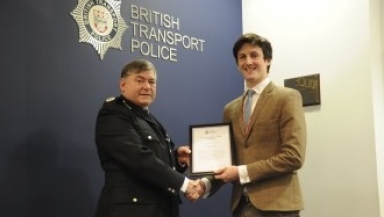
A church worker has been recognised for his efforts in bringing to justice a group of metal thieves who had been stripping lead from church roofs in Lincolnshire.
Matthew Cooper received the Exceptional Rural Initiative prize in the National Metal Theft Taskforce Awards alongside Detective Constable Richard Nethercott and Dr Dale Dishon of English Heritage.
The prize was given to Cooper in recognition of his work undertaken while serving as Historic Churches Support Officer for the Diocese of Lincoln.
He contributed to an investigation into the theft of lead from church roofs by an organised gang that targeted remote rural churches in the diocese.
The gang stole more than 70 tonnes of lead from churches but eventually all the defendants were convicted and received custodial sentences.
"Churches have been hit harder than any other type of building, and in each case the emotional impact is devastating," said Matthew.
"I'm really pleased that this award has brought attention not only to the plight of church buildings, but also to the good work that is being done by different agencies working together."
Thieves often target church roofs that are not visible from the ground, and the theft may not be spotted until it has caused major problems like water leakage into the building. In addition to roofing material, damage to walls and precious art or engravings can be considerable.
It is not uncommon for the cost of replacing the metal and repairing the damage to run into tens of thousands of pounds, and fundraising can take months and years to complete. Some churches have suffered the heartbreaking scenario of being robbed more than once.
Cooper is now employed as Church Maintenance Support Officer in the Diocese of London, where he is continuing to work against metal theft from churches.
Part of his work has been liaising with the City of London and Metropolitan police forces in improving responses to instances of theft.
The Venerable Tim Barker, Archdeacon of Lincoln, said: "The theft of metals from churches, and the associated damage of the fabric of historic churches, has caused great anger and hurt in many rural communities across historic Lincolnshire.
"It is good news that the combined efforts of the staff of the Diocese of Lincoln, English Heritage and the Police have been acknowledged in these awards and we are especially pleased that Matthew Cooper's work has been recognised.
"Sadly, metal theft remains a problem, and I urge communities to report incidents and suspicions to the Police."
The Diocesan Advisory Committee for the care of churches (DAC) continues to work closely with parishes around the diocese to protect our national heritage. If you would like more information on some of the methods you can use to protect your church, please contact Keith Halliday on 01522 50 40 47.













